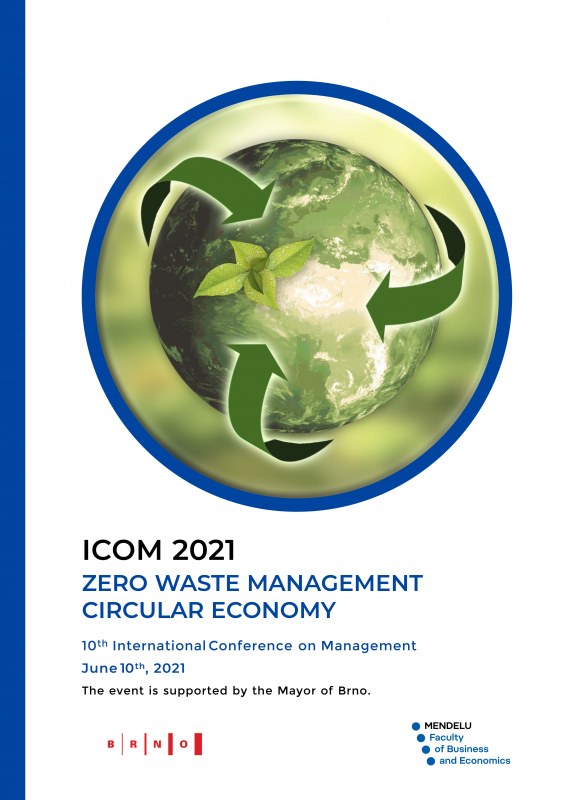
DOI: 10.11118/978-80-7509-820-7-0119
PATTERNS OF SUSTAINABLE CONSUMPTION IN HIGH CONSUMPTION SOCIETIES. CASE OF POLAND
- Felicjan BYLOK
The aim of this paper is to identify the patterns of sustainable consumption and the barriers that emerge during their implementation.
Methodology: The assumed aim was executed thanks to the application of the method of critical analysis of both national and international literary sources associated with sustainable consumption, while also the analysis of the findings of empirical research in the scope of occurrence of the patterns of sustainable consumption.
Findings: The findings of the empirical research indicate the relatively widespread application of the patterns of consumer behaviour that are characteristic of sustainable consumption on the part of consumers in Poland. Their dispersal is certified to by the increase in behavioural traits such as: the segregation of waste, the use of multi-use bags, partial restraint from driving cars, avoidance of the purchase of products that are harmful to the environment and the increase in the consumption of vegetables in the household. Barriers to its development would include the increasing use of utilities (electricity, water) in households, while also the increase in the indicator of motoring and the rising air pollution.
Research limitations: The research findings acquired, with regard to their varied nature (survey research, quantitative research) constitute the basis for limited conclusions.
Practical implications: The research findings provide knowledge on the magnitude of sustainable consumption and its barriers to development, which may serve the purpose of preparing new solutions in the policies of sustainable development.
Social implications: The research findings illustrated in this paper indicate changes in the attitudes of consumers with regard to the choice of products and the forms of consumption that are characteristic of sustainable consumption.
Keywords: consumer behaviour, ecological consumption, sustainable consumption, sustainable development
pages: 119-128
References
- Black, I. 2010. Sustainability through anti-consumption. Journal of Consumer Behavior, 9(6): 403-411, DOI:10.1002/cb.340
 Go to original source...
Go to original source... - Bylok, F. 2018. Konsumpcja zrównoważona jako element bezpieczeństwa, In: Sala K. (ed.). Polityka ekologiczna. Kraków: Wydawnictwo Naukowe Uniwersytetu Pedagogicznego, pp.149-160.
- Carrington, M. J., Neville, B. A., Whitwell, G. J. 2014. Lost in translation: Exploring the Ethical Consumer Intention-behavior Gap. Journal of Business Research, 67(1): 2759-2768. DOI: doi.org/10.1016/j.jbusres.2012.09.022
 Go to original source...
Go to original source... - CBOS. 2016. Deklaracje Polaków dotyczące marnowania żywności. Komunikat z badań nr 115/2016, Available at: https://www.cbos.pl/SPISKOM.POL/2016/K_115_16.PDF [access 15.05.2021].
- CBOS. 2020. Świadomość ekologiczna Polaków. Komunikat z badań nr 163/2020. Available at: https://www.cbos.pl/SPISKOM.POL/2020/K_163_20.PDF [access 15.05.2021].
- Odyssee Mure. 2021. Electricity consumption per dwelling. Available at: https://www.odyssee-mure.eu/publications/efficiencyby-sector/households/electricity-consumption-dwelling.html [access 17.05.2021].
- European Commission. 2017. Special Barometer, Attitudes of European citizens towards the environment. Survey requested by the European Commission, Directorate-General for Environment and co-ordinated by the Directorate General for Communication. Available at: http://mehi.hu/sites/default/files/ebs_468_en_1.pdf [access: 22.06.2021].
- Eurostat. 2020. Energy, transport and environment statistics, 2020 edition. Luxembourg: Publications Office of the European Union,.
- Galli, A., Wackernagel, M., Iha, K., Lazarus, E. 2014. Ecological Footprint: Implications for biodiversity. Biological Conservation, 173: 121-132. DOI: 10.1016/j.biocon.2013.10.019
 Go to original source...
Go to original source... - Gilg, A., Barr, S., Ford, N. 2005. Green consumption or sustainable lifestyles? Identifying the sustainable consumer. Futures, 37(6): 481-504. DOI: 10.1016/j.futures.2004.10.016
 Go to original source...
Go to original source... - Jackson, T. 2007. Sustainable consumption, In: Atkinson, G., Dietz, S., Neumayer, E. (eds.). Handbook of Sustainable Development. Cheltenham, UK and Northampton, MA, USA: Edward Elg Publishing Limited, pp.254-271.
- Lin, D., Galli, A., Borucke, M., Lazaru, E., Grunewald, N., Martindill, J., Zimmerman, D., Mancini, S., Iha, K., Wackernagel, M. 2015. Tracking Supply and Demand of Biocapacity through Ecological Footprint Accounting, In: Dewulf, J., De Meester, S., Alvarenga, R. A. F. (eds.). Sustainability Assessment of Renewables-Based Products: Methods and Case Studies. Hoboken, NJ, USA: Wiley, pp. 179-200.
 Go to original source...
Go to original source... - Liu, Y.,Qu, Y., Lei, Z., Jia, H. 2017. Understanding the Evolution of Sustainable Consumption Research. Sustainable Development, 25 (5): 414-430, doi: 10.1002/sd.1671
 Go to original source...
Go to original source... - Ottman, J. A. 2003. Green Marketing: Challenges and Opportunities for the New Marketing Age. Lincolnwood: NTC Business Books.
- Oxford Commission on Sustainable Consumption. 2000. Report on the Second Session of the Oxford Commission on Sustainable Consumption. OCSC 2.8. Oxford: Oxford Centre for the Environment, Ethics and Society.
- Potočnik, J. 2014. European Commissioner for Environment, We need a new revolution In: New Environmentalism Summit. Brussels, 3 June 2014. Available at: http://europa.eu/rapid/pressrelease_SPEECH-14-424_en.htm [accessed: 18.06.2021].
- Rees, W., Wackernagel, M. 1996. Our Ecological Footprint: Reducing Human Impact on the Earth, Vancouver: New Society Publishers.
- Rumianowska, I. 2013. Ekokonsumpcja jako warunek efektywniejszego wykorzystania zasobów przyrodniczych a świadomość i zachowania konsumentów polskich. Research Papers of Wrocław University of Economics, 318: 364-375. DOI: 10.15611/pn.2013.318.35
 Go to original source...
Go to original source... - Seyfang, G. 2009. The New Economics of Sustainable Consumption. Seeds of Change. Houndmills, Basingstoke, Hampshire: Palgrave Macmillan.
- Statistics Poland. 2015. Sustainable Development Indicators for Poland 2015. Katowice 2015.
 Go to original source...
Go to original source... - Statistics Poland. 2020. Statistical Yearbook of the Republic of Poland 2020. Warszawa.
- Triodos Bank. 2017. Ethical Consumer Markets Report 2017. Available at: http://www.ethicalconsumer.org/portals/0/downloads/ec%20markets%20report%202017.pdf [accessed: 18.06.2021].
- WHO. 1992. United Nations Conference on Environment and Development (1992), Report by the Director-General. EB91/INF.DOC./5. Available at: https://apps.who.int/iris/bitstream/handle/10665/171232/EB91_Inf.Doc-5_eng.pdf [accessed: 18. 06. 2021]
- Wang, P, Liu, Q., Qi, Y. 2014. Factors influencing sustainable consumption behaviors: a survey of the rural residents in China. Journal of Cleaner Production, 63: 152-165. DOI: 10.1016/j.jclepro.2013.05.007
 Go to original source...
Go to original source... - World Wide Fund for Nature. 2016. Living Planet Report 2016: Risk and resiliense in e new era. WWF. Available at: https://wwfint.awsassets.panda.org/downloads/lpr_2016_full_report_low_res.pdf [accessed: 18. 05. 2021].


